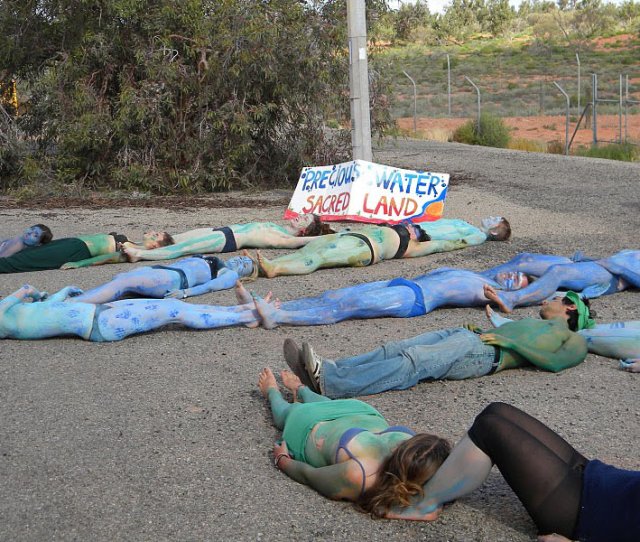
After spending over two weeks on the road together, students and activists onboard the New South Wales “Indigenous Solidarity Ride” stopped at Olympic Dam on July 15 to protest against a proposed uranium mine expansion.
The bus riders travelled through rural NSW and South Australia to attend the Defending Indigenous Rights: Land, Law, Culture convergence in Alice Springs over July 7-9. They also took part in the Students of Sustainability conference in Adelaide.
Solidarity bus riders used their bodies to send a message at July 15 demonstration. They painted themselves blue and green to symbolise water and toxic waste, and formed human chains to spell out “No U Mine” and “Water”.
One protester locked himself to a vehicle at the facility's gate. The mine's main entrance was shut down for more than two hours, forcing traffic to be rerouted through another gate and holding up one truck.
The Olympic Dam expansion would make it one of the largest open-cut mines in the world, increasing uranium production five times.
Local traditional owners and Indigenous communities campaigning against the mine spoke at Students of Sustainability and the Alice Springs convergence about the significant damage the mine expansion would do to sacred Aboriginal sites and the environment, especially local water reserves.
Zane Alcorn, an Indigenous Solidarity Ride spokesperson, said: "Not only is the expansion at Olympic Dam going ahead without the consent of traditional owners, but tens of millions of litres of water per day are already being sucked out of the Artesian Basin on Arabunna land to service the mine.
“Australia is the driest continent on the Earth and faces a massive water shortage. It is ludicrous that we are literally exporting our sacred and precious water.
“For us, it was important to stand up and say that Australia should not be the world's uranium supplier. [It] is against the wishes of traditional owners and contributes to the nuclear fuel cycle, which adds to weapons proliferation and long-life nuclear waste.”
Since returning, solidarity bus riders have addressed public meetings in Sydney, the Blue Mountains and Wollongong. Several are taking part in the Friends of the Earth Nuclear Freeways tour, which seeks to inspire and link the communities along the waste route from Lucas Heights nuclear plant to the proposed nuclear waste dump site in the Northern Territory at Muckaty.
Alcorn said: “Coming out of the bus trip, there are people committed to supporting the Muckaty campaign ... and Indigenous resistance to the NT Intervention.”